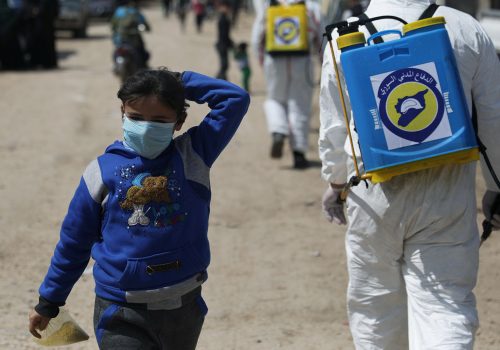CORONAVIRUS ALERT 3/27/2020
The Atlantic Council’s Coronavirus Alert is a regular summary of policy, economic, and business events around the emergency. To stay updated, sign up to the Coronavirus Alert here.
Summary:
The number of recorded coronavirus cases and deaths has more than doubled in the past week, with the death toll approaching 25,000 people. The pace of increase in casualties in the United States has been even higher, with hot spots emerging in a handful of states beyond New York, the epicenter of the US outbreak. UK Prime Minister Boris Johnson became the first world leader to test positive for coronavirus.
Statistics:
There are now more than 540,000 cases worldwide in about 175 countries and territories; nearly 25,000 people have died.
QUOTE: “When the president says the state of New York doesn’t need 30,000 ventilators, with all due respect to him, he’s not looking at the facts of this astronomical growth of this crisis,” New York Mayor Bill de Blasio said, Bloomberg reported. “If they don’t have a ventilator, a lot of people are just not going to make it.”
HEALTH AND SCIENCE:
- The United States now has more recorded cases of coronavirus than any other country, with New York as the epicenter and accounting for about half of known cases, The New York Times reported. The death toll in the United States stands at 1,271 and has roughly quadrupled over the past week, the newspaper said. Hot spots are in a handful of states, including New York, New Jersey, Washington, Louisiana, and California, but cases across the United States are increasing “as containment efforts falter, the virus spreads, and testing ramps up,” The New York Times said.
- The increase in the death toll in Louisiana and Michigan is “punishing,” The Washington Post said. The reporting of coronavirus cases is incomplete as states struggle to deal with a surge in cases, the newspaper reported. New cases at the hospital in Washington state that contended with the first outbreak a few weeks ago seem to be levelling off, the Post also reported.
- Global cases and deaths from coronavirus have more than doubled in the past week, led by the United States, Italy, and Spain, The Wall Street Journal reported.
- British Prime Minister Boris Johnson became the latest high-profile figure to test positive for coronavirus, Bloomberg reported. Johnson, who has mild symptoms, is self-isolating in his Downing Street offices and will continue to lead the country using videoconferencing, the news service reported.
- Chinese President Xi Jinping offered support on coronavirus to US President Donald J Trump during a phone call on March 27, Reuters reported. The pair agreed to cooperate on tackling coronavirus following weeks of rising tensions, Bloomberg said.
- Social behavior, demographics, and testing facilities are some of the reasons why Italy and Spain have among the highest coronavirus death tolls, CNBC reported, citing health experts.
- “The differing perspectives are made possible by the fact that the data we have so far are not very good,” economist Tim Harford writes in the Financial Times. He refers to a modelling study by University of Oxford (many in Europe may have already had the virus and have probably developed immunity to some extent) versus much grimmer modelling by Imperial College London. “This uncertainty is unnerving.”
- Algeria extended restrictions to nine more provinces, imposing a curfew to limit the spread of coronavirus, Reuters reported. The government set a curfew in the capital this week and a total lockdown in the neighboring province of Blida, the news service said. Other countries in Africa, including the Democratic Republic of Congo and Kenya, are trying to ring-fence cities, Reuters also said.
- As of March 26, 8,439 cases have been confirmed in Latin America and the Caribbean, a 40 percent increase from March 23. Sixteen countries have registered 143 coronavirus-related deaths in the region, doubling March 23’s head count. Based on the latest statistics, the pace of contagion appears to be diminishing for the moment, a result partially attributable to the collective isolation measures implemented in the past few weeks. These measures included mitigation policies to “flatten the curve” and prevent health system overload, as well as measures to alleviate the economic impact of coronavirus (as seen in Argentina, Brazil, Chile, Colombia, Costa Rica, Dominican Republic, Ecuador, El Salvador, Guatemala, Honduras, Mexico, Panama, Paraguay, Peru, Puerto Rico, and Uruguay)
- Amid a shortage in personal protective equipment, or PPE, including masks, news service Stat publishes a report from hospitals responding to the coronavirus crisis.
QUOTE: “They put on their garb and they show up. That’s what they do,” said Dr. Sylvie de Souza, the chair of emergency medicine at Brooklyn Hospital, The New York Times reported. “Of course they have anxiety, of course they have fear, they’re human. None of us knows where this is taking us.”
FINANCE AND ECONOMICS:
- US House of Representatives leaders rushed to convene enough legislators to avoid a delay in passing a $2 trillion economic support package, after a Republican lawmaker Rep. Thomas Massie (R., Ky.) suggested he might object to the bill passing by voice vote, The Wall Street Journal reported. Many legislators had planned to stay away from the Capitol to lessen the risk of travel during the coronavirus outbreak, the newspaper said.
- More than 40 million Americans could lose their jobs by mid-April following the record 3.3 million jobless claims report on March 26, The Washington Post reported, citing economists. “The most terrifying part about this is this is likely just the beginning of the layoffs,” said Martha Gimbel of Schmidt Futures, the newspaper reported.
- European Union leaders clashed about how to respond to the economic impact of the coronavirus crisis despite spending more than five hours on a video conference call, the Financial Times reported. Germany and other northern countries rejected calls to issue joint “coronabonds,” the newspaper said. The survival of the European project is at stake, Reuters cited French President Emmanuel Macron as saying.
- Business and consumers in Italy became much more pessimistic about their prospects in March, and sentiment was lowest among service providers as an extensive lockdown in the country tightened even more, The Wall Street Journal reported.
- The UK’s housing market has been put on hold as realtor viewings are suspended and banks expressed concern about lending “when the economy is in freefall,” the Financial Times reported. Lenders have agreed to extend existing mortgage offers, the newspaper said.
- Volkswagen, the world’s largest automaker, called on the European Central Bank to speed up its plan to purchase short-term debt directly from the world’s biggest companies to help them cope with the coronavirus crisis, the Financial Times reported. VW closed its European plants last week, and the auto industry outside China has come to an almost complete halt, the newspaper said.
- “The pandemic is causing a trifecta economic shock to the global economy as aggregate demand collapses, supply chains are interrupted, and financial markets swing wildly,” writes the Atlantic Council’s Bart Oosterveld. “As the economic impact lengthens and deepens, additional large drivers of employment become affected including construction, education, and manufacturing.”
QUOTE: “States are facing huge shortages—and not just of ventilators, mask,s and health-care personnel,” Catherine Rampell writes in The Washington Post. “They’re about to confront enormous budget shortages, too. This is the sleeper issue of the current economic crisis, and aiding states now could well be the difference between a brief recession and a prolonged depression.”
BUSINESS AND TRAVEL:
- Beirut will keep Lebanon International Airport closed to private and commercial passenger flights through April 12, Reuters reported. Lebanon extended a national lockdown by two weeks on March 26, also through April 12, the news service said.
- Singapore Airlines plans to raise about $10.5 billion in convertible bonds and news shares, to bolster its finances following a slump in demand for travel caused by the coronavirus pandemic, The Wall Street Journal reported.
- The North American tour of BTS, the massively popular K-pop band, and Switzerland’s Art Basel, the world’s biggest modern art fair, have both been rescheduled for September because of the coronavirus pandemic, The Washington Post reported.
QUOTE: “If we think this is a big issue in the U.S. and Europe, we haven’t seen anything yet if Covid gets into the refugee population,” said Adam Coutts, a public health researcher at Cambridge University, The New York Times reported. “People can’t even wash their kids, let alone wash their hands.”
RESOURCES
- Johns Hopkins University interactive web-based dashboard to visualize and track reported cases in real-time.
- CDC provides frequent updates and background information on Coronavirus.
- The World Health Organization daily situation reports.
- Harvard Business Review guidance on managing the emergency for corporate decisionmakers.



